Amidst the Israel-Hamas war, Beijing sees an opportunity to differentiate itself from the West’s unconditional support for Israel and gain favour in the global south. But the conflict has revealed China’s lack of political weight in the region – and an opportunity for European engagement.
The Israel-Hamas war could be China’s first major diplomatic challenge in the Middle East in recent history. Since the launch of the Belt and Road Initiative (BRI) ten years ago, China’s influence in the region has rapidly increased, culminating last March with the Beijing-brokered Saudi-Iranian rapprochement. But over the years, China has carefully remained out of the region’s geopolitical complexities, maintaining balanced and friendly relations with all main powers, including Iran, Israel, and the Arab states. Israel especially has become one of China’s key strategic partners in the region, and a source of advanced technologies, critical for China’s tech race with the United States.
The Israel-Hamas war is however reviving old regional fractures, making it difficult for Beijing to maintain its balancing act. Despite having built a solid relationship with Israel since the 1990s, China’s history as a leader of the non-aligned world has always made it a strong supporter of the Palestinian cause. China does not officially designate Hezbollah or Hamas as terrorist organisations. In the past, it consistently condemned Israel for its violations of international law and called repeatedly for a two-state solution within the 1967 borders. However, China’s support of the Palestinians remained mainly rhetorical and did not interfere with its flourishing commercial ties with Israel.
This time, China’s position on the horrific attacks of 7 October risks significantly damaging its relationship with Israel. After nearly two weeks of silence, Chinese leader Xi Jinping made a rather bland statement, calling for a ceasefire and stated that the establishment of “an independent state of Palestine” through a two-state solution was the “fundamental way out” of the conflict. He refrained however from explicitly condemning Hamas or calling it a terrorist organisation. The Chinese ministry of foreign affairs’ statement did not even name Hamas, only condemning “all violence and attacks on civilians”. Meanwhile, the foreign minister, Wang Yi, criticised Israel for “going beyond self-defence” and called for an end to “collective punishment of the Gazan people”. The Chinese position triggered bitter responses amongst Israeli officials and media, and Israel’s foreign ministry expressed its “deep disappointment” over China’s failure to condemn Hamas.
If China takes the risk to alienate Israel, it is because it sees broader stakes in the current conflict that reach beyond the Israel-Palestine issue. Beijing sees in the crisis an opportunity to differentiate itself from the West’s support for Israel and to boost it credentials within the global south, where many countries remain strongly sympathetic to the Palestinian cause. Since the beginning of the crisis, many countries in the Middle East and beyond have increased their criticism of the West’s double standards when it comes to respecting international law, recalling Western pressures to support Ukraine after the Russian invasion. At the UN, the US and European countries appeared isolated when they voted against resolutions supported by Russia, Brazil, China and other non-Western countries that called for a ceasefire.
International divisions over the current crisis have only fuelled China’s narrative that the Western-led global order needs to be reshaped. In recent years, China has sought to promote itself as an alternative leader on the international scene. It offered to serve as a mediator in several conflicts – including in Ukraine – and launched the global development, security and civilisation initiatives with the aim to challenge the Western-led global order. The Israel-Palestine issue is one of the conflicts for which China proposed several peace plans and mediation initiatives since the early 2000s. Prior to Palestinian Authority president Mahmoud Abbas’s visit to Beijing in June, China’s former foreign affairs minister, Qin Gang, renewed his offer to facilitate peace talks. Following the Hamas attack, Chinese foreign minister Wang Yi called for an international peace conference and Beijing dispatched its special representative Zhai Jun to the region.
But despite these efforts, China appears rather helpless on the current escalation, beyond a few statements. None of the past mediation initiatives it proposed between Israel and the Palestinian Authority ever gained traction. Given Beijing’s current reluctance to condemn Hamas, a Chinese mediation on the ongoing crisis appears even less likely than before.
After a few years of hype on China’s growing influence in the Middle East, the ongoing escalation in Gaza highlights China’s lack of political weight in the region: Its actions have damaged Sino-Israeli relations without significantly boosting its relations with the Arab states. Instead, the conflict has re-emphasised the geopolitical dominance of the US. It took nearly two weeks for Xi Jinping to make a statement about the crisis, when US and European leaders and senior diplomats had already been touring Israel and the Middle East for a week. The US, countering recent debates about its withdrawal from the region, dispatched two aircraft-carrier strike groups to the Mediterranean, prepared around 2,000 personnel for a potential deployment, and is discussing a new $14 billion military support package to Israel. The UK, France, Denmark, and Germany also positioned aircraft carriers and ships in the eastern Mediterranean. Even outside of Western powers, Russia currently appears much more proactive than China in shaping the debate in international forums such as the UN.
If China shows very little desire to help de-escalate the crisis beyond a few bland statements, it may also be because it sees no interest in doing so. During foreign minister Wang Yi’s visit to Washington on 26-28 October, the US pressed China to lever its relationship with Iran and other Middle Eastern countries to defuse regional tensions and prevent the conflict from spreading. From Beijing’s perspective however, the Israel-Palestine conflict is a war of Western creation. Unless the conflict escalates into a broader regional turmoil, its core interests – mainly energy security and freedom of navigation – are only marginally affected, at least for now.
On the contrary, the crisis benefits China in the broader context of its rivalry with the US. The war in Gaza diverts US attention from the Indo-Pacific, derails Washington’s efforts to facilitate the Saudi-Israel normalisation, and increases regional grievances towards the West. While China is unlikely to be a major player in the current crisis, Europeans should make sure it is not a spoiler either. The current global polarisation around the Israel-Palestine issue plays into Chinese and Russian narratives of a division between the West and the global south. Engaging with China on the current crisis would help defuse this false dichotomy on which Beijing is capitalising.
The Israel-Hamas conflict can also be an opportunity to explore areas of constructive cooperation with China in a region where both Europeans and Beijing have a common interest in stability. Coordinating on their visions of long-term stability for the region will be crucial in the years and decades to come as China’s geoeconomic power in the Middle East deepens. China could especially be a useful partner in broader regional engagement, including with Iran, with which it has developed close relations. As such, current tensions could be a good moment to ask China for greater accountability in Middle Eastern affairs: Following up on the previous Chinese mediation between Iran and Saudi Arabia, Europeans could encourage China to act as a constructive player in regional stabilisation, while remaining realistic with themselves on Beijing’s willingness to cooperate only as far as it benefits Chinese interests.
About the author
Camille Lons is Programme Coordinator for the Middle East and North Africa, ECFR.


